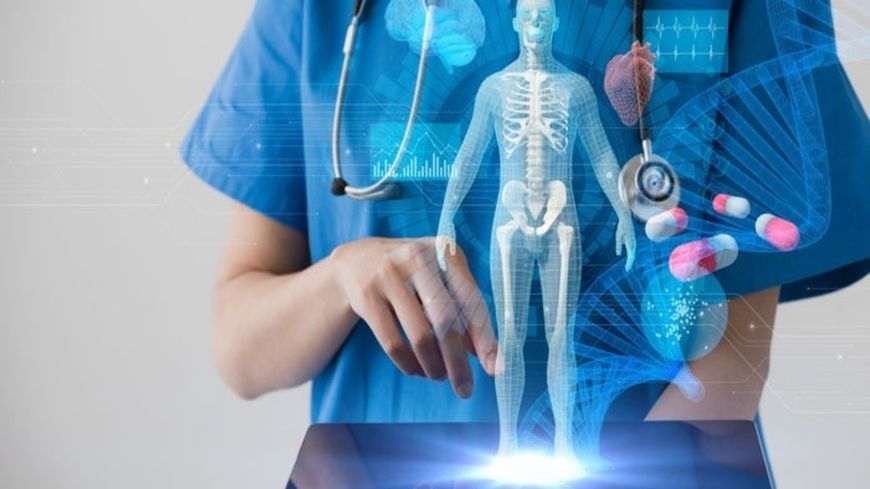5 Ways Artificial Intelligence May Affect Health Care in the Near Future and What That Means for You
Technology is changing fast, and the world is changing with it. Concepts that were mere science fiction only a couple of decades ago -- like artificial intelligence (AI) -- are quickly becoming commonplace. Computers have become powerful enough to handle complex AI computations; machine learning algorithms are more accurate and faster than ever; and the cloud and the internet of things have made it possible for even small devices to access artificial intellgence's enormous capabilities.
That's why responsible use of AI solutions in health care could improve, and even save people's lives. On the other hand, health care is an area where recklessness can occur; that's why new developments are regulated and implemented slowly and cautiously.
Here are five ways that AI and machine learning will likely be affecting your health care in the very near future:
1. Digital consultations
Digital consultations aren’t new. For many years, there have been medical diagnostic systems online or on the phone, such as WebMD or the United Kingdom’s NHS 111 system. These "dumb" systems have significant limitations.
Two developments in AI have made digital consultations using this technology a realistic option. First, the development of "backend" deep learning data allows the systems to make informed decisions about what questions to ask. Instead of blindly following a checklist, AI digital consultation systems have learned from millions of real case files to ask questions that are relevant to the particular patient.
Second, advance natural language processing is able to understand complicated sentences rather than force people to select predefined options. Together, these two AI technologies can help answer patient questions and recommend courses of action like making a GP appointment or going to the ER.
Some companies are already offering AI-driven digital consultation services. In fact, startup Babylon Health is even working with Britain's NHS to add AI to its 111 service". Ultimately, digital consultations should help cut down on unnecessary doctors’ visits and improve healthcare efficiency.
2. Radiology and images
Radiology is the form of medicine that deals with images: x-rays and ultrasounds, CTs and MRIs. This is a healthcare discipline whose practitioners spend considerable time and expertise looking at pictures as well as patients. This makes it a great fit for early AI adoption. With computer vision technology, systems can be trained to look at x-rays or other scans and apply deep learning to understand what images show.
Because the results of the AI detection can then be sent to a doctor for to double-check the results, AI for radiology is already in use in hospitals. In November, for example, the University of Rochester Medical Center announced that it was using tech from Aidoc, an AI radiology company, to help identify and prioritize critical cases so that urgent-care patients could be seen by a radiologist first, giving those patients the best of both worlds: AI and a doctor together.
Related: How is Artificial Intelligence Impacting the Healthcare Industry?
Of course, as technologies develop, it won’t be long before AI radiology solutions are consistently faster and more accurate than human doctors could be.
3. Personalized medicine: Faster, more accurate diagnosis
Personalized medicine today is kind of a utopian buzz term: a health care approach where diagnoses and treatments are highly tailored to meet the patient’s personal and family history as well as his or her specific risk factors and genetics. At the moment, many personalized medicine options are little more than fads, but AI could change that. As more and more data is collected and analyzed by deep learning models, personalized medicine may well become a commonplace.
This begins at the diagnosis stage. Home-based AI-driven diagnosis is in its infancy, but some exciting applications are being tested. Remidio, for example, makes a mobile-phone based diagnosis for diabetes by analyzing photographs of a user’s eye; this method has already been used successfully.
Eventually, AI-driven personalized medicine may be able to analyze a person’s personal genome and determine what treatments are most likely to be effective. However, the machine learning training dataset for this doesn’t exist -- yet.
4. Robot surgeons
At the other end of the scale, AI may also help in one of the most "hands-on" areas of medicine: surgery.
There have been robot solutions for surgery for years, including the advanced da Vinci system, that allows surgeons to take control of precision robotic equipment to perform minimally invasive procedures. However, these are 100 percent human-controlled machines, not artificial intelligence.
But AI is coming to robots, too. The Smart Tissue Autonomous Robot (STAR) can already suture stitches that are cleaner and more accurate than what a human surgeon can do; and early tests show the technology can also accurately remove a tumor with less damage to the surrounding tissue. And without the need for eyes, many of these robotic procedures can be conducted laparoscopically (a.k.a. “keyhole surgery”), making healing much faster and reducing the risk of infection.
The approval process for AI robot surgeons is likely to be much longer than for those technologies that help doctors do what they’re already doing. But the benefits could be enormous.
5. Cybersecurity
These new AI developments in health care will bring immense benefits to patients and ultimately to all of us by keeping us healthier for longer. But they also bring new risks in terms of security. Luckily, here, AI and machine learning themselves can help provide the solutions, too.
Medical devices are everywhere in hospitals. Many AI solutions need to be connected to the internet to make use of powerful cloud-based back-ends. That connectivity gives attackers a potential way in. Even if they aren’t connected directly to the public iInternet, medical devices of all sorts are usually open to outside communication requests.
Hospitals are being hacked at an alarming rate, forcing all stakeholders to adopt more stringent cybersecurity policies. Earlier this year, health care cybersecurity vendor CyberMDX discovered a vulnerability in a popular syringe pump that could allow an attacker to take over the device and administer lethal dosages of medication.
This is where AI could help. Advanced cybersecurity solutions could use machine learning to understand normal network behavior and identify and block any anomalous activities that could indicate vulnerabilities or attacks.
Related: The Latest Tech, From AI to Blockchain, Is Changing Health Care: Are You Ready?
Overall, AI is coming to every aspect of our lives, from our homes to our cars, to our schools and our workplaces. Thankfully, it’s coming to health care, and it’s coming soon. If you're an entrepreneur in the healthcare sector, you need to take note.
This article was originally generated here.

.jpg)



